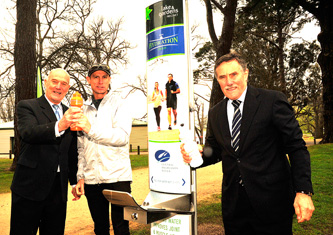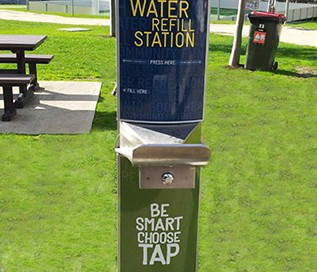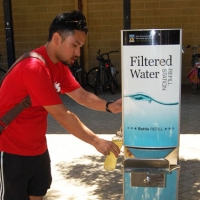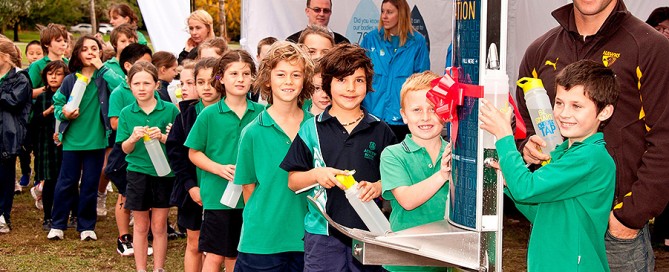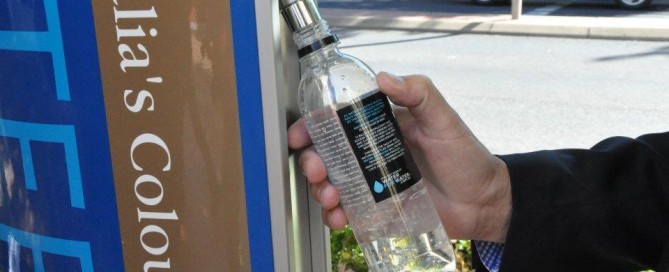A progressive public drinking water refill package from Australian company Arrow Alpha has been chosen by Sydney’s Leichhardt Council as part of its initiative to refurbish an important retail/cafe strip of this esteemed inner city sector of Sydney.
Council’s 2009/10 Main Street Improvement programme under current Mayor, Mr Jamie Parker, sees Arrow Alpha providing its‘ aquafil’ water refill station.
While Arrow Alpha is fast gaining recognition as a strong force in encouraging community water refill stations, this specific aquafil unit also shows how versatile the system can be as an aesthetic showpiece to display and reinforce the cultural history of an area.
Located on the corner of Marion and Edith Streets, this aquafil refill station has a striking facade featuring an intricate mosaic.
It acts not only as a stylised site-marker but also a showpiece community item to visually link its locale to the Italian culture that put Leichhardt firmly on the international tourist map; much like the suburb of Carlton achieves in Melbourne.
Arrow Alpha says this aspect of its refill stations is taking on a new level of importance because councils, school bodies as well as private companies and business parks can utilise aquafil’s panels for branding, marketing and decorative purposes.
Arrow Alpha is also a supplier of Australian-Standard-approved bike racks that meet modern day demand of Australian residents demand for carbon footprint reduction.
With a firm push by councillors in many areas of Sydney – particularly in central zones – to increase and integrate bicycle tracks for cleaner travel and better general health of the population, the concept of the water refill station is gaining momentum as a solution to not just provide convenient stops for drinking water but to also reduce the level of empty bottles being discarded into waste streams and on the streets.
Arrow Alpha’s water refill station in Leichhardt has been installed as part of a greater works project that includes bike racks, decorative lighting, more spacious and updated paving and tree preservation orders.
Another aquafil water refill station is being introduced in the nearby Annandale Shopping village.
Able to be tailored for the end user, aquafil is a sustainable amenity that alleviates poor hygiene problems that plagued traditional water fountains in decades past.
It has capacity for promotional space (ideal for councils and public works) and eliminates general waste issues by encouraging people to refill bottles through multiple purpose-specific refill nozzles, rather than buying throw-away bottled water.
aquafil water fountain’s bottle refill points have anti-bacterial nozzles. Wheelchair accessibility is a standard, signage facilities prominent; they have optional sub–floor drainage, and the choice of filtered water configuration if desired.
Bottle refill points are nominally positioned on the sides of these units – made of silver impregnated plastic and stainless steel to eliminate any threat of bacteria. Germ potential was one of the main reasons that traditional drinking fountains disappeared from the public landscape.
aquafil units also combat another primary reason why drinking fountains have had a long absence from parks and streets – vandalism. Anti-vandal nozzles and buttons are a feature of the product line.
Because the units comprise highly visual modular panels, it ensures space for colourful branding or promotional activity and this is well received by councils, transport authorities, shopping centre management and general businesses which can utilise this aspect of design to publicise messages on a 24/7 basis.
Arrow Alpha Industries has designed the aquafil drinking fountain and water refill unit to be maintained very easily by using off-the-shelf components.

